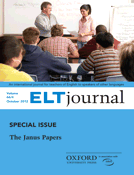
ELT Journal
Scope & Guideline
Connecting Research with Real-World ELT Applications
Introduction
Aims and Scopes
- Innovative Pedagogy in ELT:
The journal emphasizes innovative pedagogical approaches that enhance language acquisition, including task-based learning, critical pedagogy, and the integration of technology. - Multimodal and Digital Literacy:
A significant focus is placed on the development of multimodal literacy and the effective use of digital tools in language teaching, reflecting the evolving landscape of education. - Inclusivity and Diversity in Language Education:
The journal explores themes of inclusivity, diversity, and social justice within ELT, addressing the needs of multilingual and multicultural classrooms. - Teacher Education and Professional Development:
Research on teacher training, professional development, and teacher agency is a core focus, highlighting the importance of equipping educators with necessary skills and knowledge. - Global Perspectives on ELT:
The ELT Journal welcomes research that considers global and local contexts in language teaching, promoting a nuanced understanding of English as a global lingua franca.
Trending and Emerging
- Generative AI and Language Teaching:
The integration of generative AI tools for language learning and teaching has gained significant attention, exploring how technologies like ChatGPT can enhance pedagogical practices and learner engagement. - Translanguaging and Multilingualism:
Translanguaging practices are increasingly recognized for their role in supporting multilingual learners, emphasizing the fluidity of language use in educational contexts. - Well-being and Mental Health in ELT:
The emphasis on teacher and learner well-being has emerged as a critical theme, with research focusing on psychological aspects of language education and the impact of emotional factors on learning outcomes. - Critical and Social Justice Pedagogies:
There is a growing trend towards critical pedagogy and social justice in ELT, addressing issues of equity, inclusion, and the implications of language teaching in diverse sociopolitical contexts. - Digital and Multimodal Composing:
The rise of digital literacy and multimodal composing in language education highlights the importance of equipping learners with skills to navigate and create content across various media.
Declining or Waning
- Traditional Grammar Instruction:
There is a noticeable decline in research focused solely on traditional grammar instruction methods, indicating a shift towards more communicative and contextualized approaches to language teaching. - Native Speakerism:
The focus on native speakerism and its implications for language teaching has diminished, reflecting a growing acceptance of diverse Englishes and the roles non-native speakers play in language education. - Behaviorist Theories of Learning:
Research rooted in behaviorist theories of language acquisition is less prominent, as current trends favor constructivist and sociocultural approaches that emphasize learner agency and social interaction.
Similar Journals

Porta Linguarum
Elevating the discourse on contemporary language challenges.Porta Linguarum, published by UNIV GRANADA in Spain, is a pioneering journal dedicated to the fields of linguistics and language studies, with a dual focus on the educational implications and applications within these disciplines. Launched in 2008 and continuing its impactful contributions into 2024, the journal is recognized for its rigorous peer-reviewed articles that address contemporary language issues, pedagogical approaches, and linguistic research, evidenced by its notable rankings in the 2023 Scopus metrics. Porta Linguarum holds a distinguished Q1 classification in Linguistics and Language, alongside a respectable Q3 placement in Education, marking it as a valuable resource for academics and practitioners alike. With an impressive ranking of 231 out of 1088 in the Arts and Humanities category and a strong 78th percentile ranking for Language and Linguistics, this journal facilitates the exchange of innovative ideas and promotes scholarly discourse. Although currently not adopting an open access model, it remains an essential platform for advancing knowledge in linguistics and education.

Language and Literacy
Celebrating the Intersection of Language and LearningLanguage and Literacy is an esteemed journal published by LANGUAGE & LITERACY RESEARCHERS CANADA, focusing on the vital intersections of language acquisition and literacy development. With a commitment to open access since 1999, this journal provides a platform for researchers and practitioners to share innovative findings and pedagogical insights that enhance the understanding of language and literacy in various educational contexts. The journal aims to foster a dialogue among educators, researchers, and policy makers by disseminating high-quality research and facilitating discussions on best practices. Recognized for its contributions to the field, Language and Literacy serves as an indispensable resource for those dedicated to improving literacy outcomes and language education globally. Based in Victoria, BC, Canada, it invites submissions that explore theoretical frameworks, empirical studies, and applied research, thereby enriching the academic community’s knowledge base.
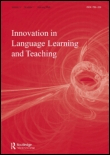
Innovation in Language Learning and Teaching
Empowering Educators with Cutting-Edge Language Research.Innovation in Language Learning and Teaching is a premier peer-reviewed journal published by Routledge Journals, Taylor & Francis Ltd, focusing on the intersection of innovative practices in language education and teaching methodologies. With a notable impact factor reflected in its recent placement in the Q1 quartile for both Education and Linguistics and Language categories, this journal serves as a crucial resource for scholars and practitioners aiming to enhance pedagogical approaches and improve learning outcomes in language education. Spanning from 2009 to 2024, it showcases cutting-edge research that addresses contemporary challenges in the field, facilitating a deeper understanding of language acquisition, pedagogy, and curriculum development. The journal is indexed in Scopus, demonstrating its significant contribution to the academic community, with impressive ranks in both the Arts and Humanities as well as the Social Sciences categories. Although it follows a traditional subscription model, the journal is committed to disseminating high-quality research that fosters collaboration and discussion among researchers, educators, and students dedicated to advancing language learning and teaching practices.
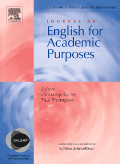
Journal of English for Academic Purposes
Transforming English Language Teaching MethodologiesJournal of English for Academic Purposes, published by ELSEVIER, is a premier peer-reviewed journal dedicated to the study and application of the English language within academic contexts. With an impressive impact factor indicative of its significance in the field, this journal is recognized in the Q1 category for both Education and Linguistics and Language, reflecting its high-quality contributions. It ranks 28th among 1088 in Arts and Humanities (Language and Linguistics) and is featured in the top percentile of Social Sciences. As an essential publication for researchers, educators, and language practitioners, it serves as a platform for innovative research that enhances academic English proficiency and teaching methodologies. With its commitment to exploring the intersection of language and education, the Journal of English for Academic Purposes is a vital resource for those aiming to advance their knowledge and practice in English language education. This journal has been actively contributing to the academic discourse since its inception in 2002 and continues to be influential in shaping the future of English language studies and pedagogy.
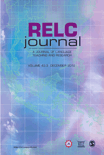
RELC Journal
Elevating Academic Discourse in Language StudiesRELC Journal, published by SAGE Publications Ltd, stands as a leading platform in the fields of Education and Linguistics, boasting an impressive Q1 ranking in both categories according to the latest metrics. Established in 1970 and continuing its commitment to academic excellence through 2024, the journal features rigorous peer-reviewed research that explores the intersections of language, culture, and pedagogy. With a notable Scopus ranking that places it in the 98th percentile for both Language and Linguistics (Rank #16/1088) and Education (Rank #91/1543), the RELC Journal is essential for scholars, educators, and practitioners seeking to contribute to and stay abreast of cutting-edge developments in their respective fields. Although currently not open access, the journal remains accessible to a diverse audience and invites contributions that challenge conventional perspectives and inspire innovative practices in language education.
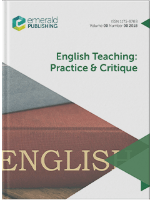
English Teaching-Practice and Critique
Empowering Educators with Critical Insights and Practical ReflectionsEnglish Teaching-Practice and Critique is an esteemed journal published by Emerald Group Publishing Ltd, focusing on the interdisciplinary fields of Education and Linguistics. With a commitment to advancing knowledge and practice in English language teaching, the journal offers a platform for innovative research, critical reflections, and practical insights that are vital for educators, researchers, and students alike. The journal has established itself in the academic community, achieving a Q3 ranking in Education and a prestigious Q1 ranking in Linguistics and Language as of 2023, highlighting its impact and relevance. Although not an open-access journal, its curated content remains accessible to a global audience, facilitating meaningful discourse and development in English language education. The journal spans articles from 2008 to 2014 and 2016 to 2024, making it a valuable resource for ongoing scholarly dialogue and pedagogical advancement. It is particularly recognized within Scopus rankings, standing at the 76th percentile in Arts and Humanities as well as the 74th percentile in Social Sciences, underscoring its significance and standing in these domains.

English Teaching and Learning
Fostering Global Dialogue in English Teaching and LearningEnglish Teaching and Learning is a distinguished academic journal published by SPRINGER SINGAPORE PTE LTD, focusing on the dynamic fields of education and linguistics. With an ISSN of 1023-7267 and an E-ISSN of 2522-8560, this journal serves as a vital platform for researchers, educators, and practitioners interested in advancing the understanding of English language instruction and learning methodologies. Recognized for its high standards, it has achieved a notable Q2 ranking in Education and a prestigious Q1 ranking in Linguistics and Language in 2023, underscoring its impact within these essential scholarly fields. The journal, which spans a converged publication period from 2015 to 2024, endeavors to disseminate innovative research, theoretical insights, and practical applications, making it an invaluable resource for anyone committed to enhancing English education globally. Although it does not operate under an open-access model, its contributions are pivotal in shaping contemporary discourse in English teaching and learning.

TESL Canada Journal
Uniting Scholars and Practitioners for Language Learning SuccessTESL Canada Journal, published by TESL Canada, serves as a vital resource for researchers, educators, and practitioners in the field of English as a Second Language (ESL) and applied linguistics. With its commitment to advancing scholarship and best practices in language education, this esteemed journal fosters a platform for the dissemination of high-quality research and innovative pedagogical approaches. Although it operates without open access, its comprehensive articles and reviews offer valuable insights into current trends and challenges faced by ESL educators across Canada and internationally. The journal is dedicated to promoting a deeper understanding of language acquisition processes and instructional methodologies, contributing significantly to the professional development of its readership. Located in Burnaby, Canada, the journal aims to bridge the gap between theory and practice, making it an indispensable source for educators and researchers looking to enhance their expertise in ESL education.
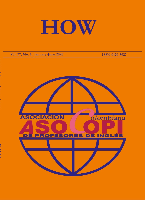
How-A Colombian Journal for Teachers of English
Exploring New Frontiers in English Education.How: A Colombian Journal for Teachers of English is a prestigious, peer-reviewed publication dedicated to advancing the field of English language teaching in Colombia and beyond. Established by the ASOC COLOMBIANA PROFESORES INGLES, this journal has embraced an Open Access model since 2014, ensuring that innovative research and teaching methodologies are accessible to a global audience. With a focus on pedagogical strategies, curriculum development, and language acquisition, How aims to foster community among educators, researchers, and practitioners dedicated to improving English language instruction. The journal's commitment to high-quality scholarship and practical applications makes it an indispensable resource for professionals seeking to enhance their teaching practices. Housed in Bogotá, Colombia, How reflects the dynamic landscape of English education in Latin America, contributing significantly to both regional and international discourse.
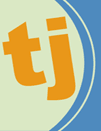
TESOL Journal
Transforming Language Learning Through Evidence-Based InsightsTESOL Journal, published by Wiley, is a premier academic journal dedicated to advancing the field of Teaching English to Speakers of Other Languages (TESOL). With an esteemed reputation reflected in its high impact factor and its Q1 ranking in both Education and Linguistics and Language categories for 2023, this journal serves as a critical resource for researchers, educators, and policy-makers. It covers a wide spectrum of topics related to language acquisition, pedagogical innovations, and educational strategies in TESOL, contributing significantly to the discourse around multilingualism and effective teaching practices. The journal is notable not only for its rigorous peer-review process but also for its commitment to disseminating high-quality research that informs and inspires practice in diverse educational settings. Interested readers can access articles through traditional subscription methods, ensuring that groundbreaking research is available to a broad audience. With converged years spanning from 2010 to 2024, TESOL Journal continues to evolve, making it a vital publication for anyone interested in the complexities of language education.